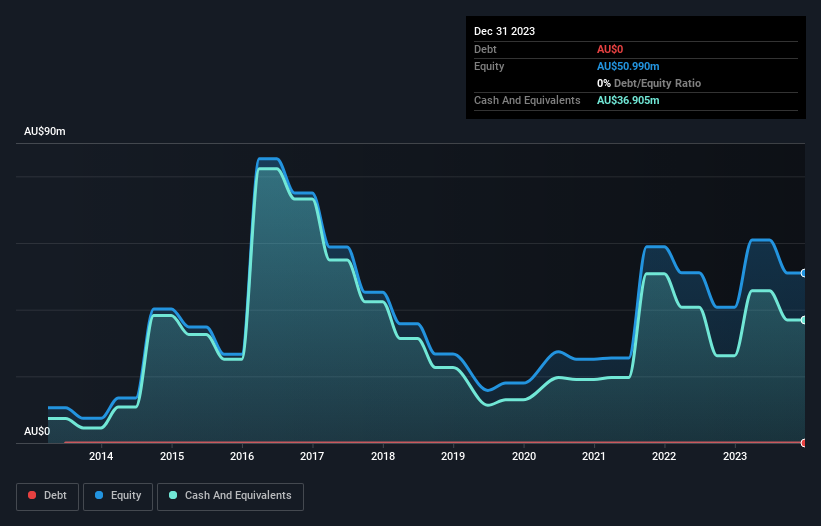- Australia
- /
- Medical Equipment
- /
- ASX:IPD
ImpediMed (ASX:IPD) Is In A Good Position To Deliver On Growth Plans
Even when a business is losing money, it's possible for shareholders to make money if they buy a good business at the right price. For example, although Amazon.com made losses for many years after listing, if you had bought and held the shares since 1999, you would have made a fortune. Nonetheless, only a fool would ignore the risk that a loss making company burns through its cash too quickly.
So, the natural question for ImpediMed (ASX:IPD) shareholders is whether they should be concerned by its rate of cash burn. In this article, we define cash burn as its annual (negative) free cash flow, which is the amount of money a company spends each year to fund its growth. Let's start with an examination of the business' cash, relative to its cash burn.
See our latest analysis for ImpediMed
When Might ImpediMed Run Out Of Money?
A cash runway is defined as the length of time it would take a company to run out of money if it kept spending at its current rate of cash burn. As at December 2023, ImpediMed had cash of AU$37m and no debt. Looking at the last year, the company burnt through AU$18m. Therefore, from December 2023 it had 2.1 years of cash runway. That's decent, giving the company a couple years to develop its business. You can see how its cash balance has changed over time in the image below.

How Well Is ImpediMed Growing?
We reckon the fact that ImpediMed managed to shrink its cash burn by 34% over the last year is rather encouraging. But the revenue dip of 5.5% in the same period was a bit concerning. On balance, we'd say the company is improving over time. While the past is always worth studying, it is the future that matters most of all. For that reason, it makes a lot of sense to take a look at our analyst forecasts for the company.
Can ImpediMed Raise More Cash Easily?
ImpediMed seems to be in a fairly good position, in terms of cash burn, but we still think it's worthwhile considering how easily it could raise more money if it wanted to. Companies can raise capital through either debt or equity. Commonly, a business will sell new shares in itself to raise cash and drive growth. We can compare a company's cash burn to its market capitalisation to get a sense for how many new shares a company would have to issue to fund one year's operations.
ImpediMed has a market capitalisation of AU$190m and burnt through AU$18m last year, which is 9.3% of the company's market value. That's a low proportion, so we figure the company would be able to raise more cash to fund growth, with a little dilution, or even to simply borrow some money.
So, Should We Worry About ImpediMed's Cash Burn?
On this analysis of ImpediMed's cash burn, we think its cash runway was reassuring, while its falling revenue has us a bit worried. Considering all the factors discussed in this article, we're not overly concerned about the company's cash burn, although we do think shareholders should keep an eye on how it develops. Its important for readers to be cognizant of the risks that can affect the company's operations, and we've picked out 2 warning signs for ImpediMed that investors should know when investing in the stock.
Of course ImpediMed may not be the best stock to buy. So you may wish to see this free collection of companies boasting high return on equity, or this list of stocks that insiders are buying.
New: AI Stock Screener & Alerts
Our new AI Stock Screener scans the market every day to uncover opportunities.
• Dividend Powerhouses (3%+ Yield)
• Undervalued Small Caps with Insider Buying
• High growth Tech and AI Companies
Or build your own from over 50 metrics.
Have feedback on this article? Concerned about the content? Get in touch with us directly. Alternatively, email editorial-team (at) simplywallst.com.
This article by Simply Wall St is general in nature. We provide commentary based on historical data and analyst forecasts only using an unbiased methodology and our articles are not intended to be financial advice. It does not constitute a recommendation to buy or sell any stock, and does not take account of your objectives, or your financial situation. We aim to bring you long-term focused analysis driven by fundamental data. Note that our analysis may not factor in the latest price-sensitive company announcements or qualitative material. Simply Wall St has no position in any stocks mentioned.
About ASX:IPD
ImpediMed
A medical technology company, develops, manufactures and sells bioimpedance spectroscopy (BIS) technology medical devices and software services in Australia, Europe, the United States, and internationally.
Excellent balance sheet with moderate growth potential.
Market Insights
Community Narratives




